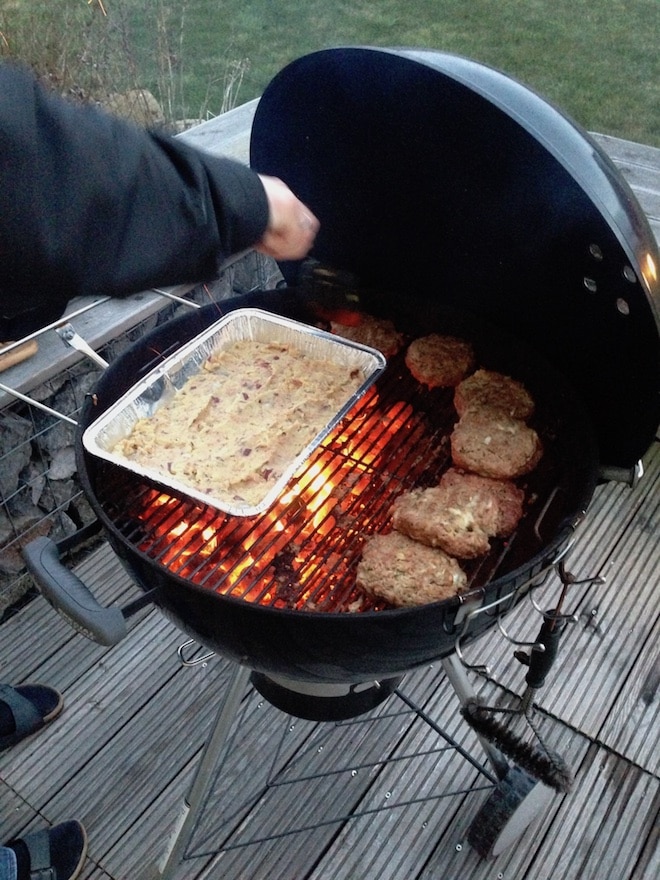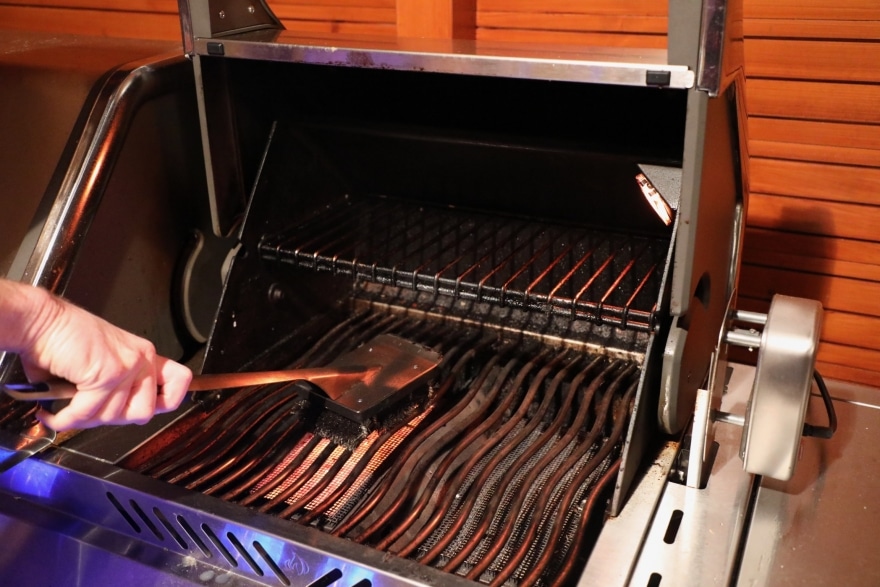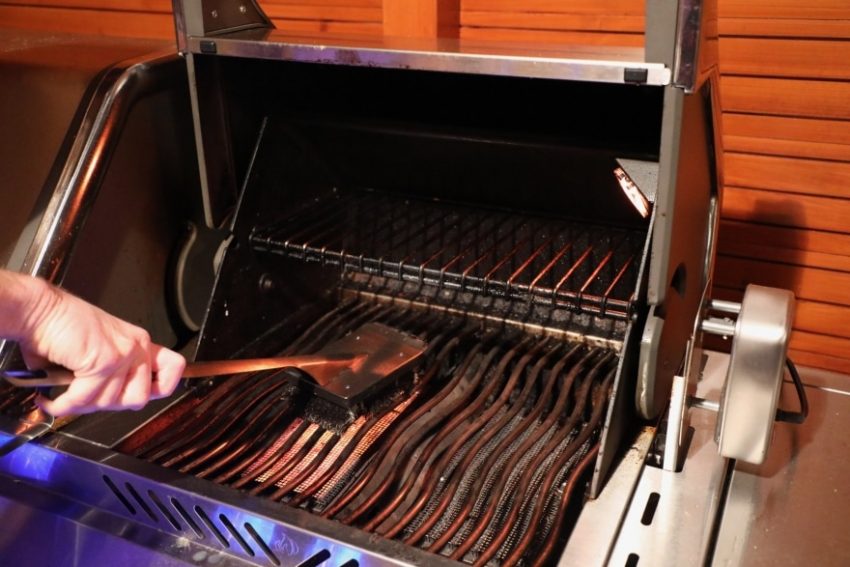Grilling is a very enjoyable social pastime. Unfortunately, thousands of accidents related to grills occur annually. Most of these accidents could have been avoided if simple safety rules had been followed. To ensure that you can enjoy the various interesting aspects of grilling without concerns, we, from the Grill Expert Team, have compiled the most important rules for grill safety for you.
Basics of safety when grilling
When grilling, one has a responsibility not only to oneself but also to the people present, especially guests and children. Children, who may not understand the dangers of a hot grill and might forget them in their playful excitement, particularly need to maintain a minimum distance of 3 meters from the grill – always!
Grills are hot and involve flames (except for electric grills) as a source of heat. This alone presents a significant potential danger if mishandled. Common sense should naturally dictate handling them with appropriate caution and paying attention to grill safety. However, accident statistics indicate otherwise. One problem arises when common sense is impaired, for example, due to alcohol. Similar to handling fireworks, many grill accidents occur due to alcohol-induced recklessness or mistakes. If someone is no longer capable of thinking clearly, let alone walking or standing straight, they should stay away from a hot grill accordingly. In such cases, a distance of 3 meters, as advised for children, is not sufficient.
Eliminating hazards while grilling requires understanding how to operate the grill. While much may seem self-explanatory with a charcoal grill, it’s different with gas grills. Most accidents with gas grills occur due to ignorance. In general, manufacturer’s instructions should be read and adhered to before using a grill. Often, they also contain tips that contribute to the specific model’s grill safety. If the user manual is no longer available, for instance, in the case of a used purchase, almost all manufacturers offer downloads for their model’s instructions on their website/service.
Safety at the grill: When it comes to buying used grills, caution is particularly advised, especially with gas grills. In such cases, one must rely on the seller’s statements. Therefore, it is always recommended to have a used grill and its accessories (gas cylinder, pressure regulator, hoses) checked by a specialist retailer before the first use. Any leaks can thus be detected and rectified.
In general, a grill should be placed in an upright and stable position. There should be sufficient space around it in case a grill is accidentally knocked over. No flammable or easily combustible materials should be nearby. Consider the heat rising upwards, for instance, under a pavilion. Having a fire extinguisher or fire blanket ready in case of a fire is not a mistake. For electric grills, avoid using water (risk of electric shock) and do not extinguish hot oil with water!
Specific hazards of different grill types
Different types of grills have common and specific hazards. A charcoal grill and gas grill, for example, both generate heat and can cause fires. However, using different types of fuel results in specific safety rules for each grill type.
Handling safety with charcoal grills
A charcoal grill is available for as little as 15 euros (disposable grill). Its low prices and wide availability (even at gas stations) make it the most commonly used grill. Its potential dangers relate to the heat and glowing charcoal. Therefore, we, from the Grill Expert Team, recommend wearing appropriate clothing while grilling. Heat-resistant gloves, grill tongs, and closed shoes should be considered as a minimum.
The worst mistake when using a charcoal grill (but also with other fire sources) is using liquid accelerants (such as spirits). Every year, severe grill accidents are attributed to using spirits while grilling. They account for 75% of all grill accidents in Germany. Spirits, when burned, generate gas uncontrollably. It forms a vapor cloud that can be ignited by a spark (such as a cigarette ember). A resulting fireball with a diameter of 3 meters and temperatures between 1,000 and 1,800 °C can severely and permanently injure people. Even deaths have occurred due to damage to the respiratory tract caused by the immense heat (inhalation trauma). Never ignite a charcoal grill with liquid accelerants! If a charcoal grill doesn’t ignite properly, numerous safe aids are available in grill accessories stores, as detailed in our accessory guide. Safe igniters, blowers, heat guns, or ignition chimneys are examples that render the dangerous use of accelerants unnecessary.
When using a charcoal grill, glowing charcoal pieces can fall to the ground. Therefore, wear shoes near the grill area, and be mindful of children running around. Even after grilling, the danger isn’t over. The duration of charcoal heat is often underestimated. Heat from the embers can still remain under the ash until the next day. Never dispose of grill ash into flammable waste bins (or bins filled with flammable material) without prior inspection. It’s best to thoroughly douse it with water beforehand.
Tip:

Especially the very inexpensive charcoal grill models often exhibit cheap and poor quality construction. There have been charcoal grills that collapsed after the third use. Therefore, consider quality regarding stability and, before each subsequent use, check and tighten the fastening screws if necessary.
Gas grill safety rules
A gas grill combines several hazards at once. Along with other grills, it is essential to adhere to common rules of grill safety regarding heat and fire hazards. However, the use of pressurized and easily ignitable liquefied gas introduces additional points to consider. Hence, only purchase gas grills that have been tested by an authorized institution and bear a certification mark (such as TÜV or GS). Similarly, gas cylinders should be regularly checked for functionality and safety, as they are subject to operational safety regulations, identifiable by a stamp.
In handling gas grills, leaks pose the greatest danger. Therefore, every connection and hose should be checked for leaks. Applying a mixture of water and detergent to connections and hoses helps detect leaks through the formation of small bubbles. Particularly, older pressure regulators or gas hoses become leaky over time. Hence, replace the hoses every 2 to 5 years and have the pressure regulator checked at a specialist retailer at least every two years. Pressure regulators or reducers reduce the high gas cylinder pressure to the required operating pressure for your grill, typically 30 or 50 mbar (as indicated in the operating instructions). They can fail in their function due to dirt particles. As the age of purchased used parts is often uncertain, it is best to have them checked regardless. Anyone purchasing a gas grill must also consider the storage of gas cylinders. Storage in basement rooms or garages is prohibited. Regulations only allow storage in well-ventilated rooms or ideally outdoors with appropriate weather protection. More information can be found in our Gas Cylinder Storage section.
As gas hoses are particularly prone to weaknesses, they should be handled carefully. They should not be frequently bent in a tight radius, and heavy loads should not run over them. Keep them away from heat sources.

Cleaning enhances gas grill safety: To avoid accidents due to defective pressure regulators or hoses, grill safety can be increased through dual pressure regulators and hose
breakage protections. Unfortunately, these safety-related equipment items are not standard. However, those who prioritize grill safety can acquire them subsequently.
If all inspections reveal no issues, here’s the correct procedure for starting a gas grill:
First, open the lid of the gas grill to prevent gas concentrations from forming underneath.
Check if all control knobs are in the ‘Off’ position, then turn on the valve of the gas cylinder.
Ignite one burner with the grill ignition according to the user manual (possibly with a match). The other burners are only switched on after the first burner has ignited.
Then, the lid can be closed again until the grill reaches the desired temperature.
Electric barbecue grill safety
Even though an electric grill operates without fuel, there are still safety considerations to follow. Typically, electric grills have a power of 2,000 watts. The heat generated by an electric grill is as dangerous as any other grill. Although it operates without a flame, it can still set flammable materials on fire. Therefore, no flammable items should be near it. Also, nothing flammable should be on the ground in case the electric grill is accidentally knocked over. As it runs on electricity, special attention should be paid to its storage and operation during dry conditions. Moisture can lead to creeping currents, short circuits, and electric shocks. Powerful electric grills can even cause the fuse to trip on weak power lines. Never replace a tripped fuse with a stronger one! Fuses protect the house wiring. If they trip, it means the power load for the line is definitely too strong. Stronger fuses lead to overloading the line, causing cable fires, permanent short circuits, and potentially setting the house on fire. The power cord should be laid so that nobody can trip over it. To prevent the grill from being moved over by the cable in such a case, it is better to secure it in advance (for example, to a sturdy table leg).
Electric grills are often used on balconies or indoors. In such cases, a hot electric grill should not be left unattended. Even after turning it off, it can still radiate enough heat to cause fires. In the event of a fire, never extinguish the electric grill with water, as there is a risk of electric shock. Additionally, hot oil must not be extinguished with water, as it leads to an explosion, spreading burning oil throughout the area.


